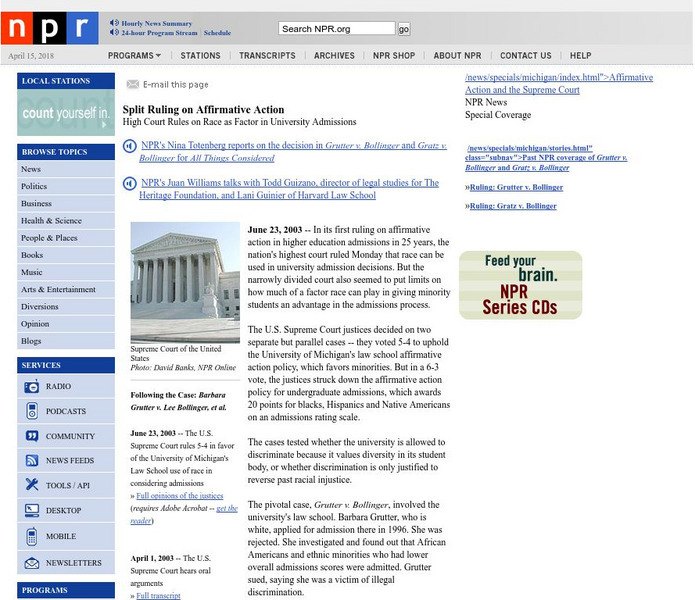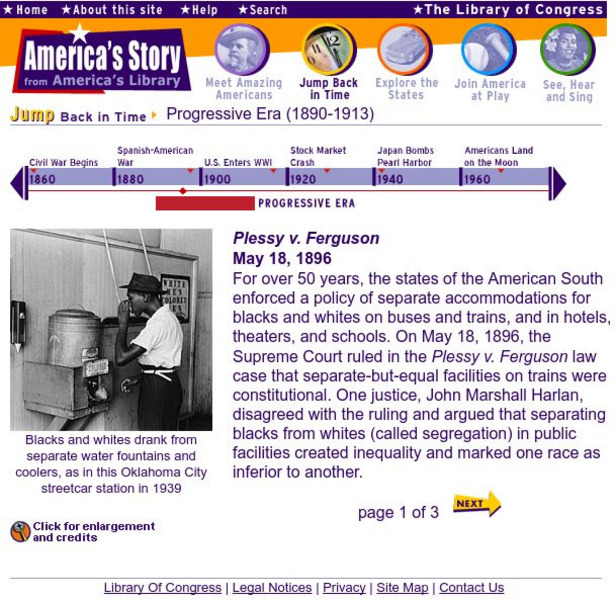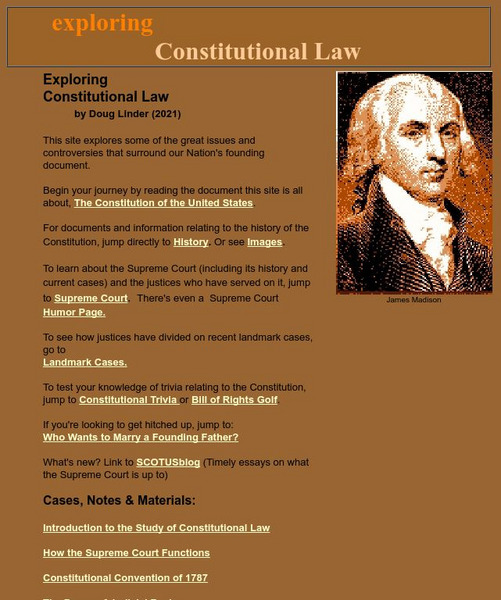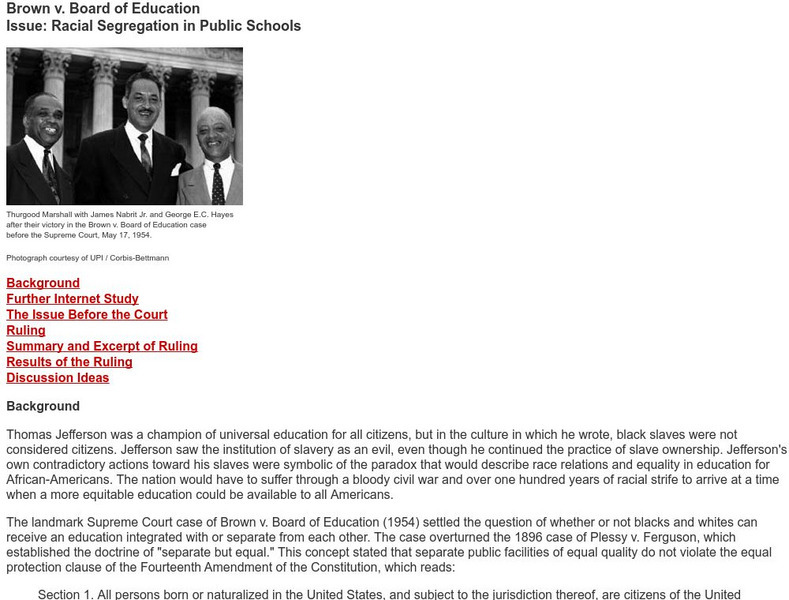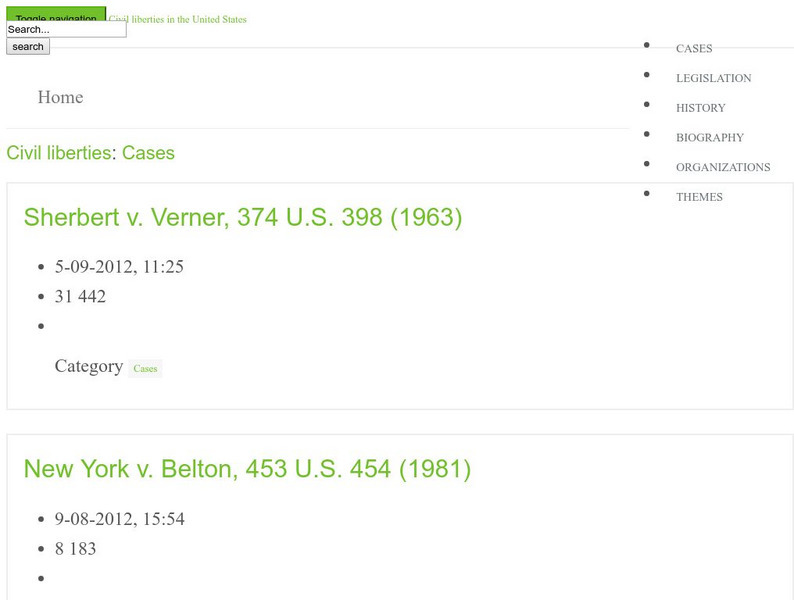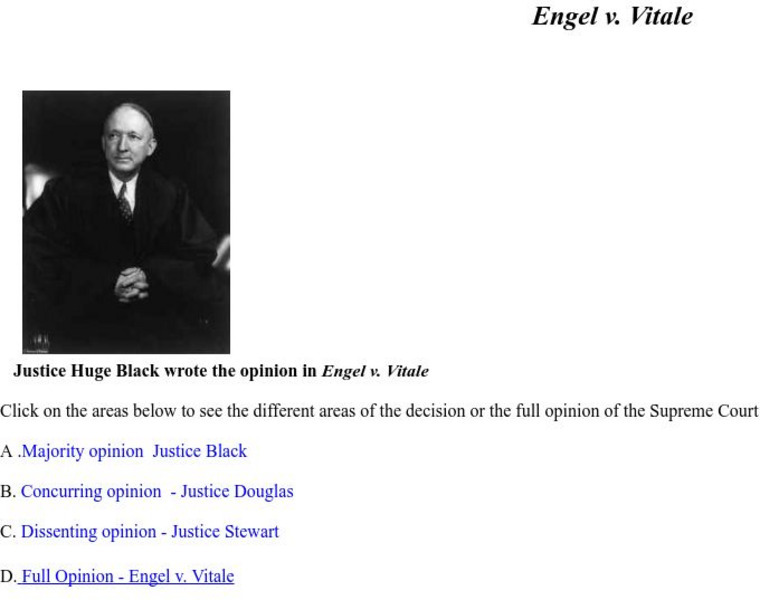Hi, what do you want to do?
NPR: National Public Radio
Npr: Split Ruling on Affirmative Action
This multimedia site explores the Supreme Court reaction to affirmative action cases in university admissions policies. There are links to audio clips and various related articles.
Thomson Reuters
Find Law: Article Iii: Federal State Courts Relations
This resource shows the relationship between the Federal and State Courts as stated in Article III of the U.S. Constitution. This annotated text details issues like problems raised by concurrency, autonomy of state courts, and rules of...
Other
Litigator's Internet Resource Guide: The Rules of Court
A database of the rules, forms, and dockets for both the state and federal court systems.
iCivics
I Civics: Elk v. Wilkins (1884)
This mini-instructional activity examines the Supreme Court's ruling that the 14th Amendment's Citizenship Clause did not apply to American Indians born on Native reservations. Students analyze a primary document and discover how the...
Other
Justia: u.s. Supreme Court Center: Cases and Opinions: Search and Seizure
A comprehensive overview of the Fourth Amendment, on the legality of searches and seizures of persons or property, makes note of Supreme Court rulings on the subject of unreasonable searches and searches.
Library of Congress
Loc: America's Story: Plessy v. Ferguson
The decision of the Supreme Court in Plessy v. Ferguson kept black and white people separate in all public areas for many years. To find out what that meant, and to see some actual photographs, visit this page.
PBS
Pbs News Hour: Assessing the Alito Nomination
Transcript, audio, and video of an October, 2005 report discussing previous rulings and stances taken by U.S. Supreme Court nominee Samuel Alito.
University of Missouri
Exploring Constitutional Conflicts: Exploring Constitutional Law
Although the Constitution is the supreme law of the land, its interpretation is open to many opinions, causing great controversies. Students can read the Constitution as well as the many issues that surround the document. If that proves...
Other
Model Supreme Court Courtroom Protocol and Procedures
Sample courtroom protocol and procedures from the YMCA Youth & Government website.
Bill of Rights Institute
Bill of Rights Institute: Texas v. Johnson
This Landmark Supreme Court Cases and the Constitution eLesson focuses on a case involving expressive conduct, and what is for many a deeply cherished symbol of America, the U.S. flag. In a closely divided (5-4) ruling, the Supreme Court...
Illinois Institute of Technology
Oyez Project: Mc Culloch v. Maryland (1819)
The Supreme Court ruling in this landmark case declared that states could not tax federal institutions.
Smithsonian Institution
National Museum of American History: Separate but Equal: The Law of the Land
A brief description of the Supreme Court decision, Plessy v Ferguson, in 1896, that solidified the separate but equal rule. Included is the title page of the Supreme Court text of the decision.
PBS
Enlightenment: Brown v. Board of Education
Site offers background, further study links, the issue before the court, the ruling and results, and discussion ideas for the landmark Supreme Court decision in Brown v. Board of Education.
Other
Civil Liberties: Lyng v. Northwest Indian Cemetery Protective Association
How does the constitution resolve a conflict between the government's property rights and the right of groups to engage in religious practices on lands they consider sacred? The Supreme Court answered that question in favor of the...
Alabama Learning Exchange
Alex: John Marshall: True to His Party?
Students will take part in an inquiry-based lesson in which they will analyze the rulings by John Marshall as Chief Justice of the Supreme Court. After evaluation, they will justify through blogging whether John Marshall held up the...
US National Archives
Docsteach: From Dred Scott to Civil Rights Act of 1875: Eighteen Years of Change
In 1857, the U.S. Supreme Court ruled in the Dred Scott decision that African-Americans were not citizens of the United States. Yet within 18 years, Black Americans would not only have citizenship, but would be guaranteed the right to...
Other
Civil Rights Movement Veterans: Rock Hill and Charlotte Sit Ins
Timeline is provided from May, 1954 when the Supreme Court rules "separate but equal" is unconstitutional to 1982 when Friendship College closes it doors. Brief entries for each important date of the sit-in movement, including the Rock...
Other
Biography Base: Orval Faubus Biography
The biography of Arkansas politician Orval Faubus who was famous for his stand against integration of Little Rock, Arkansas schools in 1957 in defiance of U.S. Supreme Court rulings.
NBC
Nbc Learn: 1954: Separate Is Not Equal
In this video/lesson series we will explore a watershed moment in the Civil Rights movement that came in the Brown v. Board of Education decision. The Supreme Court rules unanimously that, "separate educational facilities are inherently...
C-SPAN
C Span Classroom: Teaching About King v. Burwell
Learning module with lesson plan in which students learn about the various for and against positions of the A.C.A. (Affordable Care Act) by watching C-SPAN videos and reading related articles, then participate in a classroom deliberation...
Other
Northwest Arkansas Community College: Landmark Cases: Engle v. Vitale
At this site, you can read either the full opinion or just areas of the decision of the Supreme Court case of Engle v. Vitale which ruled on the constitutionality of school prayers.
PBS
Pbs Online News Hour: Virtual Victory?
Discussion of the implications of the Supreme Court ruling against the constitutionality of the Communications Decency Act, including give and take on the meaning of the decision for children. Includes transcript of discussion, and link...
Khan Academy
Khan Academy: The Montgomery Bus Boycott
Read about the action of Rosa Parks who refused to give up her seat on a bus in Montgomery, Alabama in 1955, triggering a massive bus boycott led by Martin Luther King, Jr. The boycott became the impetus for a Supreme Court ruling that...
Independence Hall Association
U.s. History: The Fight for Reproductive Rights
Along with demands for other rights in the 1960s and 1970s came the demand for reproductive rights. Read the development of ideas from the introduction of birth control pills in 1960 to the contentious Supreme Court ruling in Roe v Wade...





